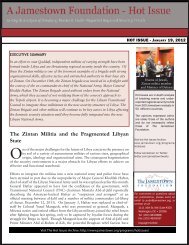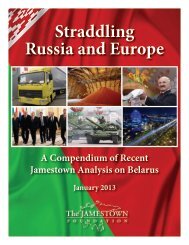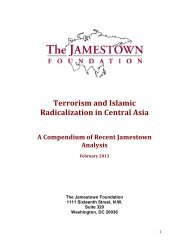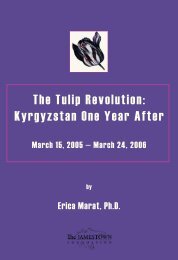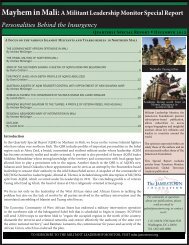ChinaBrief In a Fortnight - The Jamestown Foundation
ChinaBrief In a Fortnight - The Jamestown Foundation
ChinaBrief In a Fortnight - The Jamestown Foundation
Create successful ePaper yourself
Turn your PDF publications into a flip-book with our unique Google optimized e-Paper software.
<strong>ChinaBrief</strong> Volume XII s Issue 21 s November 6, 2012<br />
put that prediction to the test.<br />
Prashanth Parameswaran is a PhD candidate at the Fletcher<br />
School of Law and Diplomacy at Tufts University and a freelance<br />
journalist. He has written widely about international affairs in the<br />
Asia-Pacific and blogs about the region at <strong>The</strong> Asianist [www.<br />
asianist.wordpress.com].<br />
Notes:<br />
1. For specific examples and a broader discussion<br />
of this, see, Bonnie Glaser “China’s Coercive<br />
Economic Diplomacy: A New and Worrying<br />
Trend,” Center for Strategic and <strong>In</strong>ternational<br />
Studies, August 6, 2012.<br />
2. Carlyle A. Thayer, “Background Briefing: Brunei:<br />
National Security Outlook,” Thayer Consultancy,<br />
August 22, 2011.<br />
3. Carlyle A. Thayer. “ASEAN’s Code of Conduct<br />
in the South China Sea: A Litmus Test for<br />
Community-Building?” <strong>The</strong> Asia-Pacific Journal,<br />
Vol. 10, Issue 34, No. 4, August 20, 2012.<br />
***<br />
Shifts in Beijing’s Afghan Policy: A<br />
View From the Ground<br />
By Raffaello Pantucci and Alexandros Petersen<br />
<strong>In</strong> a clear but still gradual shift over the past year,<br />
Chinese policymakers have changed their stance<br />
on Afghanistan from cultivated disinterest to growing<br />
engagement. As the potential security vacuum left by<br />
Western withdrawal in 2014 comes into sharper relief,<br />
Beijing has come to realize that it will have to play a role<br />
in encouraging a more stable and developed future for<br />
Afghanistan. As with China’s engagement in Central Asia<br />
as a whole, Chinese activity in Afghanistan is less a part<br />
of a grand strategy for the region and more the sum of<br />
number of disparate parts. Nevertheless, the sum of these<br />
parts could have major consequences for Afghanistan and<br />
the region’s trajectory as it signals a growing realization by<br />
Beijing of the role it will find itself playing in the future.<br />
<strong>The</strong> most visible and significant element of China’s<br />
renewed focus on Afghanistan was marked by the visit<br />
in late September of Politburo member and security<br />
10<br />
supremo Zhou Yongkang to Kabul (Xinhua, September<br />
24; China Daily, September 24). This was the first visit by a<br />
Politburo-level Chinese official to the country since 1966<br />
when President Liu Shaoqi visited the country just prior to<br />
being purged during the Cultural Revolution. It marked,<br />
however, the latest in a growing series of high-level visits<br />
and meetings marking China’s more focused attention on<br />
Afghanistan. This attention dates back to February 28,<br />
2012, when Beijing hosted the first Afghanistan-China-<br />
Pakistan trilateral dialogue. Held at the level of foreign<br />
ministry director-general positions (or rough equivalents),<br />
the meeting was given a senior stamp of approval when the<br />
group was met by Chinese Foreign Minister Yang Jiechi<br />
a day after the discussions (Afghan Ministry of Foreign<br />
Affairs, February 28). <strong>The</strong>n in June, as China was hosting<br />
the Shanghai Cooperation Organization (SCO) Summit<br />
in Beijing, President Hu Jintao signed a bilateral “strategic<br />
and cooperative partnership” agreement with President<br />
Karzai as well as welcoming the country to becoming an<br />
official SCO observer (Xinhua, June 8). President Karzai<br />
thanked President Hu for helping facilitate the SCO<br />
upgrading, saying “without your support, we cannot do<br />
this” (Xinhua, June 8). Just over a month later on July 27,<br />
this was followed by a further high level meeting between<br />
China’s Central Military Commission Vice Chairman<br />
General Guo Boxiong and Afghan Defense Minister<br />
Abdul Rahim Wardak. <strong>The</strong> focus of the meetings was<br />
to “enhance strategic communication and strengthen<br />
pragmatic cooperation in order to contribute to bilateral<br />
strategic cooperation” (Xinhua, July 27). <strong>The</strong> full impact<br />
of relationships established during this visit, however,<br />
may have been undermined by Wardak’s resignation<br />
after a no confidence vote in Kabul just over a week<br />
later (Reuters, August 7). Whatever the case, the growing<br />
importance China accords to the bilateral relationship<br />
would have been emphasized again in late September by<br />
Zhou Yongkang’s visit.<br />
<strong>The</strong> importance of Zhou’s visit was not only the<br />
symbolism of a senior Chinese visitor to Kabul, but also<br />
the emphasis that his presence casts on China’s interests<br />
in Afghanistan. Within the (now outgoing) Politburo,<br />
Zhou is responsible for security matters, primarily<br />
domestic, something that highlighted China’s interest<br />
in Afghanistan’s potential as a safe haven for militants.<br />
With an eye toward the withdrawal of U.S. and NATO<br />
combat forces in 2014, China increasingly has expressed<br />
concern about the possible spillover of militancy from






